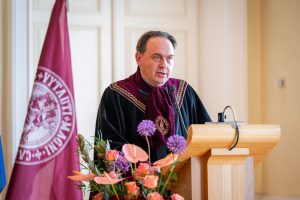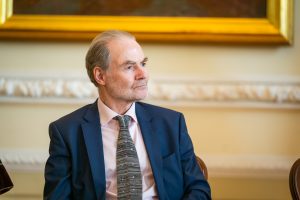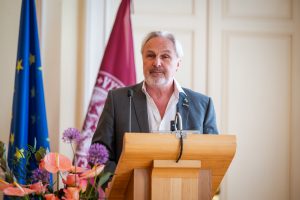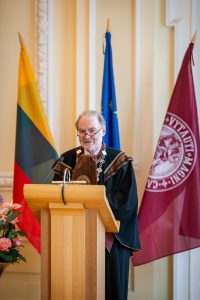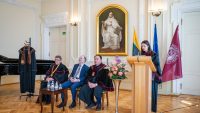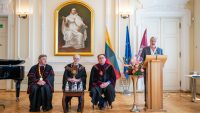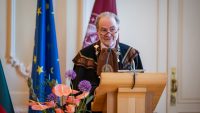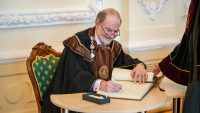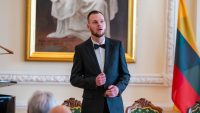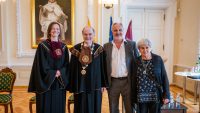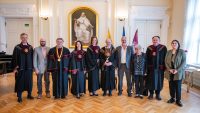VMU Honorary Doctorate Awarded to Professor Timothy Garton Ash

On 20 May, Vytautas Magnus University (VMU) held a solemn meeting of the VMU Senate, during which British historian, Professor Timothy Garton Ash was awarded an Honorary Doctorate.
Prof. Garton Ash was awarded the title of VMU Honorary Doctor for his merits in international cooperation and strengthening of democracy, as well as for his significant contribution to fostering the values of freedom, justice, and solidarity.
In his welcome speech, the Chair of the VMU Senate, Prof. Ričardas Krikštolaitis, emphasised that this year we are celebrating two anniversaries – the 35th anniversary of the re-establishment of VMU and the 20th Anniversary of Lithuania’s accession to the European Union – which, in today’s global context, prompt us to reflect on the fundamental values that guide our university and our country: personal and academic freedom, democracy, openness, and responsibility.
“VMU was re-established on the basis of the Artes Liberales concept – driven by academic freedom, creativity, internationalism, and humanism that were unprecedented in Lithuania at that time. We are truly delighted that our university’s honorary doctorate list will be enhanced by yet another person who cares deeply and fights for these European values,” said Prof. Krikštolaitis.
Introducing Professor Timothy Garton Ash to the guests of the solemn VMU Senate meeting, VMU Vice-Rector for Communications, Assoc. Prof. Vilma Bijeikienė, highlighted that much of his work focuses on the contemporary history of Europe, particularly the countries of Central and Eastern Europe, the region’s former communist regimes, the analysis of secret police archives, and the transformation of the former Eastern Bloc states into member states of the European Union. Prof. Garton Ash has also researched Europe’s role in the world and the challenges of political freedom, diversity, and freedom of expression.
“Prof. Garton Ash’s scholarly influence can be compared to that of national leaders such as Václav Havel and Joachim Gauck. During the Cold War, Prof. Garton Ash gained recognition as a champion of freedom of speech and human rights in the Soviet Union and Eastern Bloc countries, with a particular focus on Germany and Poland, which he also explored in his books. The historian strongly opposes conservative and populist EU leaders such as Viktor Orbán in Hungary and Jarosław Kaczyński in Poland. He has expressed concerns about Vladimir Putin, Donald Trump, and Brexit, and advocates for a liberal, pro-EU British perspective,” Assoc. Prof. Bijeikienė said.
Prof. Garton Ash’s connection with VMU primarily extends through the activities of the Andrei Sakharov Research Centre for Democratic Development. Prof. Garton Ash contributes to the development of the content for the Sakharov conference and has delivered a presentation at the 2021 conference. Prior to the establishment of the Centre, the historian maintained relations with Professor Leonidas Donskis.
VMU Rector Prof. Juozas Augutis also delivered a welcome speech. “I am sincerely pleased that today we can welcome a distinguished figure, historian, and journalist, Professor Timothy Garton Ash, among the Honorary Doctors of Vytautas Magnus University. It is truly gratifying that our university community is enriched by a personality who is distinguished by broad scholarly and practical activity, exceptional erudition, and an enduring commitment to the fight for human rights,” said the Rector.
In his speech, Prof. Robert van Voren, Director of the Andrei Sakharov Research Centre for Democratic Development, not only reminded the attendees of Lithuania’s path to independence but also highlighted the ongoing struggles for freedom in Ukraine and Sakartvelo.
“Freedom is hard to gain but easy to lose. A generation has grown up in Lithuania, untouched by the fear instilled by the Soviet regime, yet remembering what their parents and grandparents fought for. As soon as Russia invaded Ukraine, we immediately established the VMU Centre of Ukraine in Vilnius to provide all the necessary support to Ukrainians fleeing the war during this difficult time. Today, more Ukrainian flags fly on the streets of Lithuania than in any other Western European country,” the VMU professor emphasised Lithuania’s support for Ukraine, recalling that the bells that rang in Kyiv on 11 December 2013, calling Ukrainians to gather in Maidan Square to fight for democracy, still ring to this day.
Accepting the VMU Honorary Doctorate regalia, Prof. Garton Ash stressed that it was a great honour and privilege for him to receive such recognition. “First of all, I would like to congratulate all members of the VMU community on the 35th anniversary of the university’s re-establishment. VMU was re-established in 1989, which I dare say was the most interesting year, marked by historic turning points in Europe. It was the year the Berlin Wall fell and a new phase of European history began,” said the professor in his speech, also highlighting the path of Eastern European countries to independence and their return to the European family after the fall of the Soviet empire, though some nations still struggle to survive.
“Today we see the courageous people of Sakartvelo fighting for their country’s democratic future under the European flag. Meanwhile, in Ukraine, Kharkiv is closer to the Russian front than London is to Oxford. Just a few days ago, I gave a speech at the University of Lviv, where many attendees have relatives – spouses, sons – risking their lives on the front lines. And I believe that the most important word of this last decade of European history should be the Ukrainian word ‘volia’ (Ukr. Воля), which means freedom and the determination to fight for it. This is certainly something that we in the West have forgotten,” Prof. Garton Ash remarked.
The professor concluded his speech by emphasising that the main duty of universities is to constantly strive for the truth and to disseminate it as widely and vividly as possible. “The Lithuanian national anthem contains the line ‘Light and truth all along, guide our steps forever.’ Through our work, whether we are academics or students, we must strive to ensure that light and truth prevail, for lies are the greatest enemy of freedom,” said historian Prof. Garton Ash.

